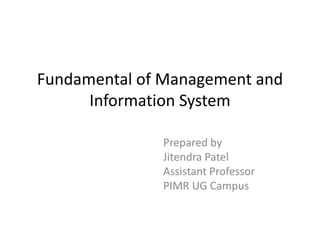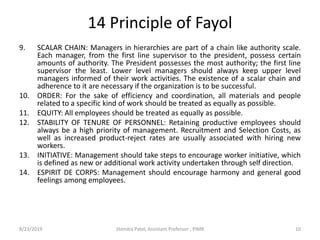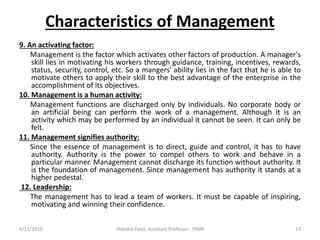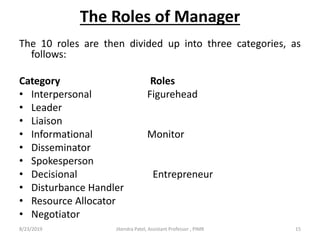Fundamental of Management and Information System
- 1. Fundamental of Management and Information System Prepared by Jitendra Patel Assistant Professor PIMR UG Campus
- 2. Module 1 1. Management Definition 1.2 Basic Characteristics of Management 2. Emergence of Management Thought 3. Classical School/Thought of Management 4. Administrative Theory of Management (Fayol's Principle) 5. Characteristics of Management 6. The Role of Manager 7. Function of Management 8. Social Responsibilities of Management 9. Ethics in Management 8/23/2019 2Jitendra Patel, Assistant Professor , PIMR
- 3. Management Definition • Management: Management is the process of reaching organizational goals by working with and through people and other organizational resources. • Management is the process of dealing with or controlling things or people. • Management is organization and coordination of activities to achieve defined objectives. • Management consist of interlocking functions of creating corporate policy and organizing, planning, controlling and directing an organization’s resources in order to achieve the objectives of that policy. 8/23/2019 3Jitendra Patel, Assistant Professor , PIMR
- 4. Basic Characteristics of Management • It is a process or series of continuing and related activities. • It involves and concentrates on reaching organizational goals. • It reaches these goals by working with and through people and other organizational resources. 8/23/2019 4Jitendra Patel, Assistant Professor , PIMR
- 5. Emergence of Management Thought 8/23/2019 5Jitendra Patel, Assistant Professor , PIMR
- 6. Emergence of Management Thought • 16th century study of low efficiency and failures of certain enterprises conducted by Sir Thomas More (1478-1535). 8/23/2019 6Jitendra Patel, Assistant Professor , PIMR
- 7. Classical management theory (Fayol and Urwick) • Henri Fayol (1841–1925) is often described as the ‘father’ of modern management. He had been managing director of a large French mining company, and was concerned with efficiency at an organisational level rather than at the level of the task. Drawing on his experience of what worked well in an organisation, he developed a general theory of business administration. • He first broke management down into five distinct elements: 1. Forecasting and Planning – looking into the future and drawing up action plans 2. Organising – building up the material and human structure of the undertaking 3. Commanding – maintaining activity amount personnel 4. Coordinating – unifying and harmonising activity and effort 5. Controlling – ensuring that things conform to rules and instructions This is a logical, rational and normative analysis of what needs to be done. But this was not a wholly abstract piece of theorising. Fayol was writing on the basis of his own, highly practical experience of management. On the basis of the five elements of management, he then proceeded to identify what he presented as 14 principles for improving managerial effectiveness. 8/23/2019 7Jitendra Patel, Assistant Professor , PIMR
- 8. • Interestingly, Fayol’s principles share a lot with those of Lyndall Urwick (1891–1983), an army officer turned management consultant, who combined ideas of scientific management and those of classical organisation theory in his writings. Like Fayol, he also came up with a list of general principles for managerial effectiveness. 8/23/2019 8Jitendra Patel, Assistant Professor , PIMR
- 9. Administrative Theory of Management (Fayol's Principle) (Management Principles developed by Henri Fayol: ) 1. DIVISION OF WORK: Work should be divided among individuals and groups to ensure that effort and attention are focused on special portions of the task. Fayol presented work specialization as the best way to use the human resources of the organization. 2. AUTHORITY: The concepts of Authority and responsibility are closely related. Authority was defined by Fayol as the right to give orders and the power to exact obedience. Responsibility involves being accountable, and is therefore naturally associated with authority. Whoever assumes authority also assumes responsibility. 3. DISCIPLINE: A successful organization requires the common effort of workers. Penalties should be applied judiciously to encourage this common effort. 4. UNITY OF COMMAND: Workers should receive orders from only one manager. 5. UNITY OF DIRECTION: The entire organization should be moving towards a common objective in a common direction. 6. SUBORDINATION OF INDIVIDUAL INTERESTS TO THE GENERAL INTERESTS: The interests of one person should not take priority over the interests of the organization as a whole. 7. REMUNERATION: Many variables, such as cost of living, supply of qualified personnel, general business conditions, and success of the business, should be considered in determining a worker’s rate of pay. 8. CENTRALIZATION: Fayol defined centralization as lowering the importance of the subordinate role. Decentralization is increasing the importance. The degree to which centralization or decentralization should be adopted depends on the specific organization in which the manager is working. 8/23/2019 9Jitendra Patel, Assistant Professor , PIMR
- 10. 14 Principle of Fayol 9. SCALAR CHAIN: Managers in hierarchies are part of a chain like authority scale. Each manager, from the first line supervisor to the president, possess certain amounts of authority. The President possesses the most authority; the first line supervisor the least. Lower level managers should always keep upper level managers informed of their work activities. The existence of a scalar chain and adherence to it are necessary if the organization is to be successful. 10. ORDER: For the sake of efficiency and coordination, all materials and people related to a specific kind of work should be treated as equally as possible. 11. EQUITY: All employees should be treated as equally as possible. 12. STABILITY OF TENURE OF PERSONNEL: Retaining productive employees should always be a high priority of management. Recruitment and Selection Costs, as well as increased product-reject rates are usually associated with hiring new workers. 13. INITIATIVE: Management should take steps to encourage worker initiative, which is defined as new or additional work activity undertaken through self direction. 14. ESPIRIT DE CORPS: Management should encourage harmony and general good feelings among employees. 8/23/2019 10Jitendra Patel, Assistant Professor , PIMR
- 11. Characteristics of Management 1. Management as a continuous process: Management can be considered as a process because it consists of planning, organizing, activating and controlling the resources (personnel and capital) of an organization. So they are used to the best advantage in achieving the objectives of the organization. None of the managerial functions would produce the ultimate results in the absence of all other basic functions. Hence we can say that management is a continuous process. 2. Management as a discipline: Since the boundaries of management are not exact as that of any other physical sciences, it may not fit in very well for being addressed as discipline. However its status as a discipline increases because it continuously discovers many aspects of business enterprises and also passes on the verified knowledge to the practitioners of the managerial process. 3. Management as a career: As a career or occupation, management is a broad concept- Management itself can be regarded as a career, but it also presents a variety of interesting and challenging careers focused on specialized occupations in the fields such as marketing, finance and personnel. 4. Management as an Applied Science: Even though management is a science so far as it possesses a systematized body of knowledge and uses scientific methods of research, it is not an exact science, like natural sciences which deal with living phenomena such as botany and medicine. Hence, management is definitely a social science like economics or psychology and has the same institutions which these and other social sciences have. 8/23/2019 11Jitendra Patel, Assistant Professor , PIMR
- 12. Characteristics of Management 5. Universal Application: Management is a universal activity, applied to any form of activity, economic or otherwise. 6. Goal Oriented: Management has the task of attaining certain objectives. The success or failure of the management depends on how far it is able to attain the desired goals. It is judged by the extent to which it achieves its targets. 7. Guidance: The main task of the management is guidance in the utilization of material and human resources in the best possible way. Through optimum utilization of resources it has to ensure that the objectives are attained. The essential element of management is that it gets the work done by coordinating the performance of those who actually perform diverse and specific jobs. 8. Divorced from proprietorship: Management does not signify proprietorship. In earlier days, management and enterprise were lumped into the same factor. It now refers to a specialized group of people who have acquired the ability to carry out a project. 8/23/2019 12Jitendra Patel, Assistant Professor , PIMR
- 13. Characteristics of Management 9. An activating factor: Management is the factor which activates other factors of production. A manager's skill lies in motivating his workers through guidance, training, incentives, rewards, status, security, control, etc. So a mangers' ability lies in the fact that he is able to motivate others to apply their skill to the best advantage of the enterprise in the accomplishment of its objectives. 10. Management is a human activity: Management functions are discharged only by individuals. No corporate body or an artificial being can perform the work of a management. Although it is an activity which may be performed by an individual it cannot be seen. It can only be felt. 11. Management signifies authority: Since the essence of management is to direct, guide and control, it has to have authority. Authority is the power to compel others to work and behave in a particular manner. Management cannot discharge its function without authority. It is the foundation of management. Since management has authority it stands at a higher pedestal. 12. Leadership: The management has to lead a team of workers. It must be capable of inspiring, motivating and winning their confidence. 8/23/2019 13Jitendra Patel, Assistant Professor , PIMR
- 14. The Roles of Manager or Management Mintzberg published his Ten Management Roles in his book, "Mintzberg on Management: Inside our Strange World of Organizations," in 1990. The ten roles are: 1. Figurehead. 2. Leader. 3. Liaison. 4. Monitor. 5. Disseminator. 6. Spokesperson. 7. Entrepreneur. 8. Disturbance Handler. 9. Resource Allocator. 10. Negotiator. From MINTZBERG ON MANAGEMENT by Henry Mintzberg. Copyright © 1989 by Henry Mintzberg. Reprinted by permission of Free Press, a division of Simon & Schuster, Inc. 8/23/2019 14Jitendra Patel, Assistant Professor , PIMR
- 15. The Roles of Manager The 10 roles are then divided up into three categories, as follows: Category Roles • Interpersonal Figurehead • Leader • Liaison • Informational Monitor • Disseminator • Spokesperson • Decisional Entrepreneur • Disturbance Handler • Resource Allocator • Negotiator 8/23/2019 15Jitendra Patel, Assistant Professor , PIMR
- 16. • Interpersonal Category • The managerial roles in this category involve providing information and ideas. • Figurehead – As a manager, you have social, ceremonial and legal responsibilities. You're expected to be a source of inspiration. People look up to you as a person with authority, and as a figurehead. • Leader – This is where you provide leadership for your team, your department or perhaps your entire organization; and it's where you manage the performance and responsibilities of everyone in the group. • Liaison – Managers must communicate with internal and external contacts. You need to be able to network effectively on behalf of your organization. • 8/23/2019 16Jitendra Patel, Assistant Professor , PIMR
- 17. • Informational Category • The managerial roles in this category involve processing information. • Monitor – In this role, you regularly seek out information related to your organization and industry, looking for relevant changes in the environment. You also monitor your team, in terms of both their productivity, and their well-being. • Disseminator – This is where you communicate potentially useful information to your colleagues and your team. • Spokesperson – Managers represent and speak for their organization. In this role you're responsible for transmitting information about your organization and its goals to the people outside it. • 8/23/2019 17Jitendra Patel, Assistant Professor , PIMR
- 18. • Decisional Category • The managerial roles in this category involve using information. • Entrepreneur – As a manager, you create and control change within the organization. This means solving problems, generating new ideas, and implementing them. • DisturbanceHandler – When an organization or team hits an unexpected roadblock, it's the manager who must take charge. You also need to help mediate disputes within it. • ResourceAllocator – You'll also need to determine where organizational resources are best applied. This involves allocating funding, as well as assigning staff and other organizational resources. • Negotiator – You may be needed to take part in, and direct, important negotiations within your team, department, or organization. 8/23/2019 18Jitendra Patel, Assistant Professor , PIMR
- 19. Functions of Management • These Functions can be summarized below: • Planning • Planning is the first tool of the four functions in the management process. The difference between a successful and unsuccessful manager lies within the planning procedure. Planning is the logical thinking through goals and making the decision as to what needs to be accomplished in order to reach the organizations’ objectives. Managers use this process to plan for the future, like a blueprint to foresee problems, decide on the actions to evade difficult issues and to beat the competition. • Organising • The second function of the management is getting prepared, getting organized. Management must organize all its resources well before in hand to put into practice the course of action to decide that has been planned in the base function. Through this process, management will now determine the inside directorial configuration; establish and maintain relationships, and also assign required resources.8/23/2019 19Jitendra Patel, Assistant Professor , PIMR
- 20. Functions of Management • Directing • It involves the implementation of plans by mobilising individuals and group efforts through motivation, communication, leadership and supervision. Directing may be defined as the process of activating the efforts of employees towards the achievement of organisational objectives. • Controlling • It is the process of regulating the ongoing activities of the organisation to ensure that they are in conformity with the established plans and produce the desired results. Through the controlling function, management can keep the organisation o its chosen track. It involves: • Establishing standards of performance • Measuring current performance • Comparing actual results with the established standards • Detecting deviations from the standards • Taking corrective actions for significant deviations. • 8/23/2019 20Jitendra Patel, Assistant Professor , PIMR
- 21. Social Responsibilities of Management Social responsibility is defined as the obligation and commitment of managers to take steps for protecting and improving society’s welfare along with protecting their own interest. The managers must have social responsibility because of the following reasons: 1. Organizational Resources - An organization has a diverse pool of resources in form of men, money, competencies and functional expertise. When an organization has these resources in hand, it is in better position to work for societal goals. 2. Precautionary measure - if an organization lingers on dealing with the social issues now, it would land up putting out social fires so that no time is left for realizing its goal of producing goods and services. Practically, it is more cost- efficient to deal with the social issues before they turn into disaster consuming a large part if managements time. 3. Moral Obligation - The acceptance of managers’ social responsibility has been identified as a morally appropriate position. It is the moral responsibility of the organization to assist solving or removing the social problems 8/23/2019 21Jitendra Patel, Assistant Professor , PIMR
- 22. Social Responsibilities of Management 4. Efficient and Effective Employees - Recruiting employees becomes easier for socially responsible organization. Employees are attracted to contribute for more socially responsible organizations. For instance - Tobacco companies have difficulty recruiting employees with best skills and competencies. 5. Better Organizational Environment - The organization that is most responsive to the betterment of social quality of life will consequently have a better society in which it can perform its business operations. Employee hiring would be easier and employee would of a superior quality. There would be low rate of employee turnover and absenteeism. Because of all the social improvements, there will be low crime rate consequently less money would be spent in form of taxes and for protection of land. Thus, an improved society will create a better business environment. 8/23/2019 22Jitendra Patel, Assistant Professor , PIMR
- 23. Management Ethics • ‘Management Ethics’ is related to social responsiveness of a firm. It is “the discipline dealing with what is good and bad, or right and wrong, or with moral duty and obligation. It is a standard of behaviour that guides individual managers in their works”. • “It is the set of moral principles that governs the actions of an individual or a group.” • Business ethics is application of ethical principles to business relationships and activities. When managers assume social responsibility, it is believed they will do it ethically, that is, they know what is right and wrong. • Though every individual and group has a set of ethical values, the following guidelines are prescribed by James O’Toole in this regard: 1. Obey the law: Obeying legal practices of the country is conforming to ethical values. 2. Tell the truth: Disclosing fair accounting results to concerned parties and telling the truth is ethical behaviour of managers. 3. Respect for people: Ethics requires managers to respect people who contact them.8/23/2019 23Jitendra Patel, Assistant Professor , PIMR
- 24. Management Ethics 4. The golden rule: The golden business principle is ‘Treat others as you would want to be treated’. This will always result in ethical behaviour. 5. Above all, do no harm: Even if law does not prohibit use of chemicals in producing certain products, managers should avoid them if they are environment pollutants. 6. Practice participation – not paternalism: Managers should not decide on their own what is good or bad for the stakeholders. They should assess their needs, analyse them in the light of business needs and integrate the two by allowing the stakeholders to participate in the decision-making processes. 7. Act when you have responsibility: Actions which cannot be delegated and have to be taken by managers only (given their competence and skill) must be responsibly taken by them for the benefit of the organisation and the stakeholders. 8/23/2019 24Jitendra Patel, Assistant Professor , PIMR
- 25. References 1. “Evolution of Management Concept” retrieved from https://www.wisdomjobs.com/e university/principles- of-management-and-organisational-behaviour tutorial-366/evolution-of-management-thought- 12679.html, Last assessed on 18 August 2019. 2. Harold Koontz, O’ Donnell and Heinz Welhrich, Essentials of Management, New Delhi, Tata Mc Graw Hill, 2008. 3. K. Aswathapa, Essential of Business Administration, Himalaya Publishing House, 2014. 4. Robbins, Stephen P., Fundamentals of Management, Pearson Education, 2009. 8/23/2019 Jitendra Patel, Assistant Professor , PIMR 25
























